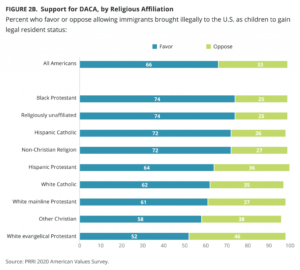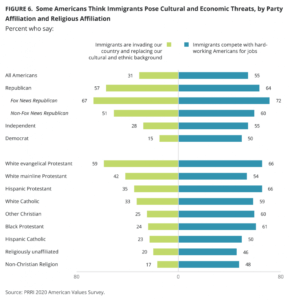What would happen if U.S. immigration policy were crafted based on the majority views of Americans?
The two major political parties express often polar opposite views on immigration, and even presidents who are perceived as open to immigration (Barack Obama being the most recent example) often enact conflicting policies out of political necessity.
After four years of the most restrictive immigration policies in modern history under the guise of Donald Trump’s “America First” doctrine, hopes are high among immigration advocates that the Biden administration not only will reverse those policies but go beyond what the Obama administration did.
The majority will of the American public often doesn’t get enacted because of the way Congress is elected.
As with other key issues, such as LGBTQ rights, public education and consumer protection, the majority will of the American public often doesn’t get enacted because of the way Congress is elected. As populations shift more to urban areas and especially to the most populous states, Senate representation is diluted for more citizens — giving North Dakotans, for example, disproportionate say to Californians. And due to extensive gerrymandering of voting districts, the U.S. House of Representatives skews more conservative than the population at large and even of the states represented.
What national opinion says
With that in mind, the Public Religion Research Institute recently took up the question of what would be enacted as policy if Washington politicians followed the majority will of the public.
The short answer, PRRI said: “American public sentiment is much closer to the policies the Biden administration is likely to implement than those put in place by the Trump administration.”
Add an emphasis to word “likely” in that sentence because the new administration is just now rolling out its immigration agenda and after that it will face the realities of both Congressional approval and the legalities of unraveling restrictions put in place by the Trump administration.
However, PRRI polling in September and October 2020 found majorities of Americans:
- Favor allowing undocumented immigrants brought to the U.S. as children to gain legal resident status (66%).
- Favor allowing all immigrants living in the country illegally a path to citizenship provided they meet certain requirements (64%).
- Oppose a law preventing refugees from entering the U.S. (62%).
- Oppose building a wall along the U.S.-Mexico border (57%).
- Oppose travel bans that temporarily prevent people from some Muslim-majority countries from entering the U.S. (53%).
- Oppose a policy that would separate children from their families at the border, which was in place briefly during Trump’s term in office (76%).
Comparing PRRI to other polling
The PRRI findings square with other data collected by Gallup and Pew Research, although the PRRI data is the most extensive current dataset on this subject.
“Public attitudes toward immigration remain mostly positive overall.”
Gallup reported in July 2020 that despite the demonization of immigrants by the Trump administration, “public attitudes toward immigration remain mostly positive overall, and support for expanding it is rising noticeably among Democrats and independents.”
Many of Trump’s efforts, such as building a physical barrier across the border and opposing a path to citizenship for DACA immigrants, “have failed to garner widespread support beyond his political base,” Gallup added. “But Trump may not be as concerned with getting majority support for his policies as he is in using the issue to energize his political base.”
And that political pandering could have created a backlash that will sway more Americans to become even more open on immigration, Gallup predicted: “Trump’s policies and rhetoric on the issue are likely accomplishing (his) goal but may also be serving to make people outside his base more positive toward immigration.”
Opinions on DACA
Pew Research specifically probed American views on DACA, an effort to grant permanent legal status to immigrants who came to the United States illegally when they were children. Polling done by Pew in June 2020 found 74% of Americans “favor a law that would provide permanent legal status to immigrants who came to the U.S. illegally as children, while 24% are opposed.”

Source: PRRI
Another sign of the influence of minority rule shaping national policy is that the vast majority of “Dreamers,” those 650,000 children and young adults affected by DACA, live in states and cities mostly favorable to them having a path to citizenship.
Although Dreamers are dispersed across all 50 states and the District of Columbia, Pew found just six states account for more than half of the total: California (184,880), Texas (107,020), Illinois (34,150), New York (28,560), Florida (25,090) and North Carolina (24,230). Further, about six-in-10 Dreamers live in just 20 U.S. metropolitan areas with the largest being Los Angeles-Long Beach-Anaheim (80,540); New York-Newark-Jersey City metro (41,800); Dallas-Fort Worth-Arlington (34,980); Houston-The Woodlands-Sugar Land (32,790); and Chicago-Naperville-Elgin (32,550).
Further, Pew’s research showed an even greater acceptance than the PRRI poll for Americans favoring a pathway to legal status for all undocumented immigrants already in the country. Pew found three-quarters of Americans say undocumented immigrants should be allowed to stay in the U.S. legally.
How faith shapes immigration opinions
PRRI analyzed American views on immigration not just as a whole but also by religious affiliation. It found that majorities of every religious group favor DACA — even 52% of white evangelical Protestants.
Support for DACA is strongest among Hispanic Catholics (72%), Hispanic Protestants (64%), white Catholics (62%), and white mainline Protestants (61%).
Majorities of every religious group believe all undocumented immigrants should have an opportunity to become U.S. citizens — including 58% of white evangelical Protestants.
PRRI also found that majorities of every religious group believe all undocumented immigrants should have an opportunity to become U.S. citizens — including 58% of white evangelical Protestants.
Support for a path to citizenship for all currently undocumented immigrants is strongest among white mainline Protestants (65%), Black Protestants (63%), Hispanic Catholics (61%), and white Catholics (59%).
Curiously, Hispanic Protestants are divided 50-50 on support for such a policy, and this group’s attitudes have become more negative over the past seven years of polling.
On the question of whether Congress should pass legislation to prevent refugees from entering the United States at all, white evangelical Protestants stand out as the only religious group with a majority in favor (58%).
PRRI reported: “Majorities of almost all religious groups oppose passing legislation that prevents refugees from entering the United States, including … Hispanic Catholics (68%), Black Protestants (67%), other Christians (60%), and Hispanic Protestants (54%). Majorities of white Catholics (58%) and white mainline Protestants (53%) also oppose legislation banning refugees.”
The place where views of white evangelical Protestants turn mostly anti-immigrant — in contrast to the national view as a whole — is on building a border wall and on banning travel from certain predominantly Muslim countries. Biden on his first day in office addressed both these issues, stopping construction on Trump’s border wall and reversing the Muslim travel ban.

Source: PRRI
While 57% of Americans oppose building a wall along the U.S. border with Mexico, such opposition drops below 50% for white mainline Protestants (48%), white Catholics (43%) and white evangelical Protestants (24%).
Likewise, while 53% of Americans opposed the Muslim travel ban in 2019, religious affiliation created sharp contrasts. White evangelical Protestants (69%) were most supportive of a travel ban, followed by other Christians (58%), white mainline Protestants (54%), and white Catholics (52%).
This coincides with the fact that white evangelical Protestants are the most likely religious group (59%) to believe that “immigrants are invading our country and replacing our cultural and ethnic background.” Overall, less than three-in-10 Americans believe this, and majorities of no other religious groups believe this.
Cautious hope for change
Elket Rodríguez, immigrant and refugee advocacy and missions specialist for the Cooperative Baptist Fellowship and Fellowship Southwest, noted that Biden’s first day in office “sparked hope among immigrants on both sides of the United States’ southern border.”
On his first day in office, Biden issued executive orders that:
- Stopped construction of the U.S.-Mexico border wall and reversed the Trump declaration of a “national emergency” that diverted millions of dollars to its construction.
- Reset enforcement priorities for civil immigration laws. The Department of Homeland Security reacted to the order by issuing a memorandum pausing deportation of some noncitizens for 100 days, starting Jan. 22.
- Instructed the secretary of Homeland Security to preserve and fortify DACA.
- Ended travel bans that restricted travel and immigration from Muslim-majority countries and instructed the State Department to restart visa applications from these countries.
- Instructed the secretary of Commerce to count noncitizens in the U.S. census.
The hope sparked internationally by the promise of the new administration could have some negative consequences in the short term, Rodriguez explained. “In the run-up to the inauguration … the Biden administration signaled it intends to avoid a rush of migrants to the southern border. Still, thousands of Central Americans suffering from persecution, violence, crushing poverty and the devastation of 2020 hurricanes seem determined to seek U.S. asylum by rushing the border.”
Meanwhile, a caravan of desperate Honduran migrants hoping to reach the U.S. arrived at Tecún Umán, a border town in northern Honduras, across Ciudad Hidalgo in Chiapas, Mexico’s southernmost state and one of the world’s busiest migrant corridors.
Saturnino Esparta, pastor of Cuarta Iglesia Bautista Adonai (Fourth Baptist Church Adonai) in Tapachula, Chiapas, reported “about a thousand migrants arrive in Tapachulas every day. The migrant flow increased in December and January, he added.
Pastors who comprise Fellowship Southwest’s immigrant relief ministry said they are seeing a daily average of 15 to 20 new migrants in the northern Mexico cities where they operate their shelters.
Pastors who comprise Fellowship Southwest’s immigrant relief ministry said they are seeing a daily average of 15 to 20 new migrants in the northern Mexico cities where they operate their shelters.
In response to the increasing migrant flow, Homeland Security released a Jan. 20 statement declaring the borders remain closed to nonessential travel. The Biden administration also has not rolled back the Centers for Disease Control and Prevention order, known as Title 42, that authorizes rapid expulsion of migrants at the border due to COVID-19.
Homeland Security also suspended new enrollments in the Migrant Protection Protocols program, also known as MPP or “remain in Mexico.” Its announcement does not say whether or when asylum seekers already enrolled in the protocols will be allowed to enter the United States.
With additional reporting by Marv Knox.
Related articles:
Religious liberty groups praise Biden’s repeal of Muslim travel ban
Panelists debate how to ‘normalize’ immigration after ill effects of Trumpism
Despite Trump crackdown, Americans still positive toward immigration
From religion to immigration to COVID, Fox News creates divisions even among Republicans
Trump administration using obscure law to deny entry to immigrants without court process


